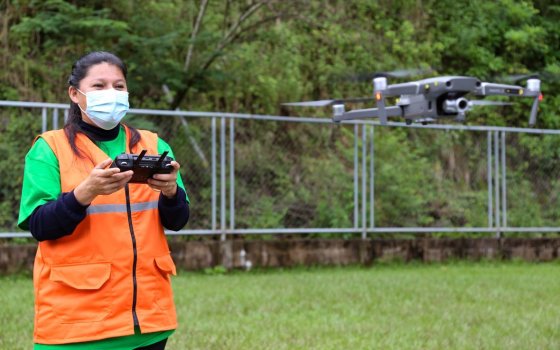K
Kathleen Martin
Guest
In the Dry Corridor of Central America, persistent drought—interrupted by violent storms that do further damage to crops—is driving farmers from land they’ve cultivated for generations. The climate crisis is obviously a sober topic, but on a clear day in October outside the town of San Antonio del Mosco in El Salvador, you wouldn’t know it. Here, seven women have gathered in an open field for a practice session with a new tool for predicting the future: a drone.
And they’re loving it.
They joke, laugh, and hug as they set out to demonstrate their expertise at assembling and launching it into the air. Even the drone, with its arms and legs outstretched, looks exuberant.
Ana Hernández steps up first to show how it’s done. She has been an avid participant in a series of projects organized by Oxfam and partners that are focused on helping women take the lead in reducing disaster risks. When she’s not cultivating her land and caring for her two youngest children, Ana is coordinating her town’s civil protection commission, participating in women’s leadership initiatives, and taking university courses to deepen her knowledge of disaster-related topics.
So, where do drones come in? They’ll enable the women to monitor water levels in the rivers, crop growth in the fields, and areas badly affected by drought—without navigating all the rough terrain they’d otherwise need to travel. And in emergencies like floods, they can help locate people whose lives may be in danger.
Hernández puts the drone through its paces and brings it in for a smooth landing, and she’s pleased with the results. “For me, fear and nervousness about operating drones are in the past.”
Inmer Arguenta Ramos, a technician from the local organization Fundación Campo (FC), cheers from the sidelines. She has been training the women and is pleased with the results. “The women overcame their fear of using the technology, and it strengthened their self-esteem.”
FC is a rural-development organization that Oxfam works closely with on programs to reduce disaster risks in the Dry Corridor. Their projects—which include economic development and natural resource protection, as well as disaster management—emphasize gender equity and youth empowerment. Oxfam has helped FC build on their technical and analytical skills so they can carry out effective, well-targeted humanitarian activities in communities hit hard by drought and other emergencies. (Read more about Oxfam’s commitment to local humanitarian leadership.)
Continue reading: https://www.oxfamamerica.org/explore/stories/women-tackle-the-drought-emergency-in-el-salvadorwith-drones/
And they’re loving it.
They joke, laugh, and hug as they set out to demonstrate their expertise at assembling and launching it into the air. Even the drone, with its arms and legs outstretched, looks exuberant.
Ana Hernández steps up first to show how it’s done. She has been an avid participant in a series of projects organized by Oxfam and partners that are focused on helping women take the lead in reducing disaster risks. When she’s not cultivating her land and caring for her two youngest children, Ana is coordinating her town’s civil protection commission, participating in women’s leadership initiatives, and taking university courses to deepen her knowledge of disaster-related topics.
So, where do drones come in? They’ll enable the women to monitor water levels in the rivers, crop growth in the fields, and areas badly affected by drought—without navigating all the rough terrain they’d otherwise need to travel. And in emergencies like floods, they can help locate people whose lives may be in danger.
Hernández puts the drone through its paces and brings it in for a smooth landing, and she’s pleased with the results. “For me, fear and nervousness about operating drones are in the past.”
Inmer Arguenta Ramos, a technician from the local organization Fundación Campo (FC), cheers from the sidelines. She has been training the women and is pleased with the results. “The women overcame their fear of using the technology, and it strengthened their self-esteem.”
FC is a rural-development organization that Oxfam works closely with on programs to reduce disaster risks in the Dry Corridor. Their projects—which include economic development and natural resource protection, as well as disaster management—emphasize gender equity and youth empowerment. Oxfam has helped FC build on their technical and analytical skills so they can carry out effective, well-targeted humanitarian activities in communities hit hard by drought and other emergencies. (Read more about Oxfam’s commitment to local humanitarian leadership.)
Continue reading: https://www.oxfamamerica.org/explore/stories/women-tackle-the-drought-emergency-in-el-salvadorwith-drones/

